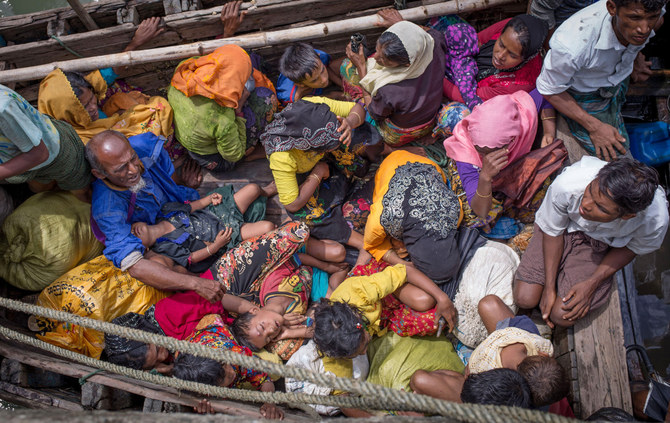JAKARTA/NEW DELHI: Activists called on the Indonesian government on Saturday to rescue hundreds of Rohingya refugees who have been adrift for weeks on boats in the Indian Ocean, amid reports of the passengers dying onboard broken vessels.
Two boats carrying refugees, including women and children, entered Indonesian waters near the northernmost province of Aceh on Friday evening, according to Amnesty International, which urged the government to allow them to safely disembark.
“Reports said that both boats are carrying children. No rescue efforts have been made as of Saturday at noon. One refugee from one of the boats allegedly died from hunger,” the group said in a statement.
“Many people, in Indonesia, Australia, and all around the world, are just ready to celebrate Christmas. The spirit of humanity that shows during Christmas must prevail in time like this…We urge the government of Indonesia to rescue the boats and allow them to safely disembark.”
The boats are believed to be two of the five that left the coast of Cox’s Bazar, the largest Rohingya refugee settlement in Bangladesh, in late November, attempting to cross the Andaman Sea to another host country.
FASTFACT
Two boats carrying refugees, including women and children, entered Indonesian waters near the northernmost province of Aceh on Friday evening, according to Amnesty International, which urged the government to allow them to safely disembark.
In early December, 154 refugees on one of the boats were rescued by a Vietnamese offshore company and handed over to the Myanmar navy, while 104 people onboard another vessel were rescued by the Sri Lanka navy on Dec. 18.
The UN Refugee Agency cited on Saturday unconfirmed reports that at least 20 people on one of the missing boats were already dead, as it urged countries in the region to “help save lives.”
Mohammed Rezuwan Khan, a Rohingya activist in Cox’s Bazar whose sister and niece are onboard one of the vessels in near the Indonesian waters, said in a broadcast message sent to journalists that the boat was “towed to the Indonesian waters by the Indian navy.”
“We ask the Indonesian government to let them disembark urgently,” Khan told Arab News.
“It’s very important for them to reach any land, to disembark on any land, because they have been at sea for almost one month, so it’s a very dire situation at the moment.”
The boat, he said, had 160 people onboard, and has been adrift off the coasts of Thailand, Malaysia, Indonesia and India since early December, when its engines broke down.
Though appeals for help are growing increasingly desperate, countries in southern Asia have yet to dispatch official help or give any indication that they intend to, according to activists.
Wisnu Pramandita, a spokesman from the Indonesian Maritime Security Agency, told Arab News that authorities have yet to locate any vessel in the country’s maritime territory.
Reza Maulana from Geutanyoe, an Aceh-based humanitarian organization that works with Rohingya refugees in Indonesia, said that technical or political issues must not be used as arguments to avoid humanitarian action.
“It is beyond all technicalities,” he said. “Rescuing endangered refugees is a must, no matter what.”
Priyali Sur, founder of the Azadi Project, a Chennai-based organization that supports refugees, said she had received a photo of a young boy aboard one of the boats who had reportedly drowned along with his family.
“All these countries have left an entire population to just fend for themselves and pretty much die at sea,” Sur said.
Arab News was unable to immediately verify the photo or reports that the boat had sunk.
In 2017, more than 730,000 Rohingya fled to neighboring Bangladesh following a brutal crackdown by the Myanmar military that the UN says amounted to genocide.
In squalid and overcrowded camps in Cox’s Bazar, Rohingya refugees have been facing increasingly complex uncertainties that have prompted them to take risky journeys in the hopes of a better life.
“I think there should be a global outreach to figure out what we can do in terms of resettlement for this community,” Sur said.
“When Ukrainian refugees started coming in, a lot of countries openly accepted them. Why isn’t that the case with the Rohingya?”






























